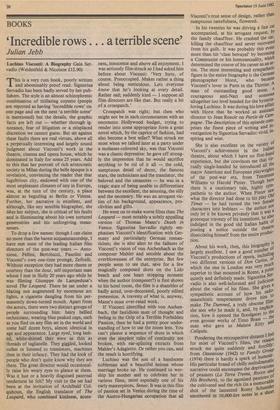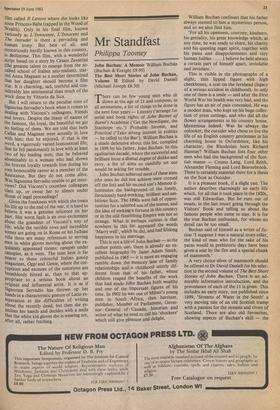BOOKS
`Incredible rows . . . a terrible scene'
Julian Jebb
Luchino Visconti: A Biography Gaia Ser- vadio (Weidenfeld & Nicolson £12.90) rr his is a very rum book, poorly written .1 and abominably proof read. Signorina Servadio has been badly served by her pub-
lishers. The style is an almost schizophrenic combination of titillating coyness (people are reported as having 'incredible rows' on one page and on the next 'a terrible scene' is mentioned) but the details, the graphic facts are left out — whether through ig- norance, fear of litigation or a misplaced discretion we cannot guess. But set against these faults there are real virtues, above all a perpetually interesting and largely sound judgment about Visconti's work in the theatre, cinema and opera house, which he dominated in Italy for some 25 years. Add to this that her portrait of rich aristocratic society in Milan during the belle epoque is a revelation, convincing the reader that that lugubrious city, endowed with one of the most unpleasant climates of any in Europe, was, at the turn of the century, a place almost as beguiling as Berlin or Vienna. Further, her narrative is excellent, and although, like any sensible biographer, she likes her subject, she is critical of his faults and is illuminating about his own tortured generosities and his unforgiving mean- nesses.
To drop a few names: though I can claim no more than the barest acquaintanceship, I have met most of the leading Italian film directors of the post-war years — Anto- nioni, Fellini, Bertolucci, Pasolini and Visconti's own one-time protege, Zefirelli. Without exception they had more charm or courtesy than the dour, self-important man whom I met in Sicily 20 years ago while he was filming Giuseppe de Lampedusa's novel The Leopard. There he sat under a blazing sun augmented by enormous arc lights, a cigarette dangling from his per- manently down-turned mouth. Apart from the actors, there were two distinct groups of people surrounding him: hairy bellied technicians, wearing blue peaked caps, such as you find on any film set in the world and some half dozen boys, almost identical in age and appearance. Large eyed, long lash- ed, white-shirted they were as thin as threads of tagliatelle. They giggled, looked sullen or listened to transistors, machines then in their infancy. They had the look of people who don't quite know why they are there. The great director would occasional- ly raise his weary eyes to glance at them. Was it lust or a heavily disguised paternal tenderness he felt? My visit to the set had been at the invitation of Archibald Col- quhoun, the English translator of The Leopard, who combined kindness, acute- ness, innocence and above all enjoyment. I was seriously film-struck so I had asked him before about Visconti: 'Very busy, of course. Preoccupied. Makes rather a thing about being meticulous. Lets everyone know that he's looking at every detail. Rather sad; suddenly kind — I suppose all film directors are like that. But really a bit of a crosspatch.'
Crosspatch was right; but then who might not be in such circumstances with an enormous Hollywood budget, trying to render into some appropriate form a great novel which, by the caprice of fashion, had also become a best seller? What struck me most when we talked later at a party under a molasses-coloured sky, was that Visconti was a classic depressive: he gave off strong- ly the impression that he would sacrifice anything to be rid of it all — the cold, sumptuous detail of decor, the famous stars, the technicians and the translator, the beloved and the catamites — he was in a tragic state of being unable to differentiate between the excellent, the amusing, the silly and the necessary. He was an arrogant vic- tim of his background, appearance, pro- clivities and gifts.
He went on to make worse films than The Leopard — most notably a subtly appalling version of Thomas Mann's Death in Venice. Signorina Servadio rightly em- phasises Visconti's identification with Ger- many and particularly German roman- ticism; she is also alert to the failures of Visconti's vision of von Aschenbach as the composer Mahler and sensible about the overblownness of the enterprise. But few people seem to see that, save for a few magically composed shots on the Lido beach and one heart stopping moment when the author (composer?) is first shown to his hotel room, the film is a shambles of badly acted, over-decorated, poorly edited pretension. A travesty of what is, anyway, Mann's most over-rated work.
If Visconti identified with von Aschen- bach, the fastidious man of thought and feeling in the Grip of a Terrible Forbidden Passion, then he had a pretty poor under- standing of how to use the zoom lens. You can't plaster a sequence of shots in which even the simplest rules of continuity are broken, with ear-splitting extracts from Mahler's Adagietto. Or rather you can, and the result is horrifying.
Luchino was the son of a handsome nobleman and a beautiful heiress whose marriage broke up. He continued to wor- ship his mother and to celebrate her in
various films, most especially one of his early masterpieces, Senso. It was in this film of passion set in Venice during the time of the Austro-Hungarian occupation that all
Visconti's true sense of design, rather than sumptuous tastefulness, flowered.
In his twenties he was driving a fast car accompanied, at his arrogant request, by the family chauffeur. He crashed the car, killing the chauffeur and never recovered from his guilt. It was probably this event more than his 'class betrayal' by becoming a Communist or his homosexuality, which determined the course of his career as an ar- tist. The most interesting and sympathetic figure in the entire biography is the German photographer Horst, who became Visconti's lover in Paris in the Thirties. A man of outstanding good sense, a courageous anti-Nazi and someone altogether too level headed for the hysteria- loving Luchino. It was during his love affair with Horst that he worked as assistant director to Jean Renoir on Partie de Cam' pagne. The description of this episode corn' prises the finest piece of writing and In- vestigation by Signorina Servadio: vivid, In- spiring and wise. She is also excellent on the variety of Visconti's achievement in the hallan_, theatre, about which I have no first-hand experience, but she convinces me that or- tually single-handed he introduced all the major American and European playwrights of the post-war era, from Tennessee Williams to Harold Pinter. Though here there is a cautionary tale, highly sym- pathetic to the author. When Pinter saw, what the director had done to his play 0141 Times — he had turned the two female characters into lesbians — the author not only let it be known privately that it was 3 grotesque travesty of his intentions, he also indulged in the good old Italian habit of posting a notice outside the theatre dissociating himself from the entire Produc- tion. About his work, then, this biography isf largely excellent. I saw a good number.° Visconti's productions of opera, including two different versions of Don Carlos, which the one in London was very much superior to that mounted in Rome, a Pot quietly and definitely made. Signorina vadio is also well-informed and judicious about the value of his films. She gives a sympathetic account of how his sada' masochistic temperament drove him te" make The Damned, a truly obscene she sees why he made it, and, by irnplica tion, how it opened the floodgates to the
.
even grosser works of Tinto Brass — the man who gave us Maison Kitty and Caligula. Pondering the retrospective distaste I feel for most of Visconti's films, the reason
.
struck me quite suddenly and forciblY. from Ossessione (1942) to Family Grail!) (1974) there is hardly a spark of humour: His particular brand of chilly melodraMaric narrative could encompass the deprivations. of peasants (La Terra Trema, Rocco and His Brothers), to the agonised passions of the cultivated and the rich (in a memorable shot of the lamented Romy Schneider smothered in 10,000-lire notes in a short film called II Lavoro where she looks like some Princess-Babe trapped in the Wood of Wealth). Only in his final film, known variously as L'Innocente, L'Innocent and The Intruder is there a pervading and human irony. But best of all, and Mysteriously hardly known in this country, is Bellissima. This film, with a wonderful script based on a story by Cesare Zavattini (the greatest talent to emerge from the so- called school of Italian neo-realism), star- red Anna Magnani as a mother determined that her daughter should become a film star. It is charming, sad, truthful and con- siderably less sentimental than much of the work done by Vittorio da Sica.
But I will return to the peculiar tone of Signorina Servadio's book when it comes to dealing with Visconti's colleagues, friends and lovers. Despite the litany of names of the famous, the loyal, the beautiful we get no feeling of them. We are told that both Callas and Magnani were actually in love with him; that he enjoyed, if that is the word, a vigorously varied homosexual life; that he fell passionately in love with at least two of his leading men; that he behaved abominably to a woman who had shown the bravest loyalty towards him during his own honourable career as a member of the Resistance. But they do not come alive. Was Signorina Servadio unable to get inter- views? Did Visconti's countless colleagues Clam up, or swear her to silence under threat of legal proceedings?
Given the frankness with which she treats his life up to the end of the war, it is hard to believe it was a genuine reticence on her Part. Her worst fault is an over-excitement about the grandeur of Visconti's way of life: while the terrible rows and incredible scenes are going on in Rome or his Ischian villa there are many references to serving men in white gloves moving about the ex-
quisitely appointed rooms: canapes under canopies, as it were. The tone here is far
nearer to those colourful Italian gossip
Magazines, Oggi and Gente, where the cor- ruptions and excesses of the notorious are breathlessly hinted at, than to that ap-
propriate to a serious book about an original and influential artist. It is as if Signorina Servadio has thrown up her hands in a characteristic gesture of Latin ex- asperation at the difficulties of writing about the recently dead; but then she ex- amines her hands and decides with a smile that the white kid gloves she is wearing are, after all, rather fetching.





































 Previous page
Previous page